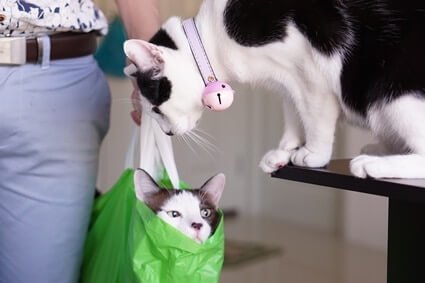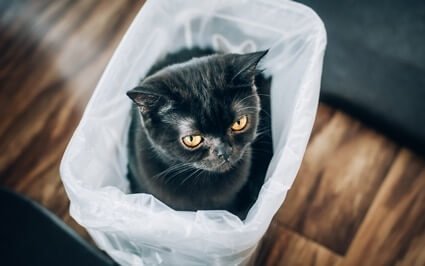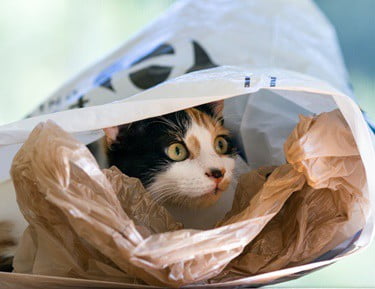The habit of chewing on plastic bags is fairly common in cats. As soon as you arrive home with groceries, your feline may spring into action, batting around the leftover bags. Although this is cute behavior, it’s also dangerous if your cat starts eating plastic. Even chewing and licking the material can lead to small pieces getting ingested accidentally.
Your cat might chew on a plastic bag because it is a curious new object worth investigating, or it considers it a fun, interactive toy. The cat may like the flavor of biodegradable plastic or enjoys the smell of food that’s left behind. Kittens often teethe on plastic bags, while stressed cats or those with dental issues chew on plastic for relief. There are times when a cat will eat a plastic bag because it’s nutrient-deficient, has pica, or has OCD.
If a cat eats a plastic bag, it’s in danger of an intestinal blockage. This can lead to vomiting, diarrhea, behavioral changes, lethargy, and even death. If the cat only eats a small piece, it might pass the bag on its own with a little discomfort. If you suspect it’s not, though, you should take your cat to the vet.
Why Do Cats Lick And Chew Plastic Bags?
If you bring home groceries and find your cat going wild for the bags, it’s cute at first. Batting around a plastic bag for entertainment is nothing unusual for a cat. However, that changes when your cat attempts to eat the bag. In fact, the cat might regularly search out plastic bags just to chew, lick, and eat. This unsafe behavior may be caused by:
Nutrient Deficiency
If your cat chews on plastics bags often, it may be missing essential nutrients. Felines thrive on a diet of fat and proteins. They will always look for these nutrients in other items when their mealtimes aren’t sufficient.
Chewing on plastic is usually an impulse. The cat may smell a faint odor that reminds it of food in the plastic. The light, floaty movements could trigger its hunting instincts and make it believe animal protein is within reach. It could even be desperate enough to chew on anything, your bags serving as only one of many options.
If so, consider swapping out your cat’s diet with more protein- and vitamin-rich foods. This should end the cravings and let your cat return to edible food.
Dental Problems
While kittens and young cats often chew on plastic during teething, adult cats may pick up this habit to soothe dental problems. Persistently chewing on a plastic bag can help reduce irritation or pressure on a cat’s:
- Teeth
- Inner mouth
- Gums
A trip to the vet can help determine if your cat has any dental issues. You should also pay attention if your cat makes any pained sounds while it chews the bags or normal food.
Taste And Texture
Some plastic bags are coated with biodegradable substances to make them more earth-friendly. Others are made entirely from organic material that can be recycled. Even if you can’t tell the difference, your cat certainly will.
In fact, cats are known to have more precise odor receptors than dogs. They can’t smell as much, but they’re better at telling individual scents apart. Your cat may be able to tell what individual materials your plastic bags are composed of. This can include:
- Cornstarch
- Stearate acid
- Gelatin
- Different salts
Cats find these substances tasty, even more so if the cat is low on nutrients. When given the chance, your feline will happily try to get a taste.
Obsessive-Compulsive Disorder
If your cat tends to chew on plastic bags, it may have obsessive-compulsive disorder (OCD). While this condition is better known in humans, it will affect cats in the same ways.
OCD is a behavioral disorder usually characterized by repetitive tendencies like eating plastic or odd items without purpose. The cause of OCD remains unknown, especially for cats. The good news is that the condition is treatable.
Smell of Food
Your cat is more likely to chew on a plastic bag if you used it to carry foodstuff and groceries. The smell of treats, bread, or meat will be alluring. With its impressive ability to detect odors, your cat will lick away at the bag for a taste, even if it’s ultimately disappointed.
Why Do Cats Chew On Plastic Bags?
These causes are more likely to apply to cats that chew on plastic bags now and then, not compulsively. Likewise, the chewing will be temporary and can resolve itself in a few minutes or a few weeks, depending on the situation.
Teething
If you have a kitten that loves chewing on plastic bags and other items, there is a high chance that it is teething. Young cats are born with milk teeth that will eventually be replaced with 30 adult teeth. As the new ones grow in and the gums begin to ache, kittens will chew on anything they can to find relief. Plastic is a nice, flexible substance that isn’t too abrasive, but it still feels pleasant to tug on.
If this is the reason, your kitten will chew on plastic bags whenever they’re clearly available. The cat won’t hunt them down, and it will pick a different object just as easily.
The habit should crop up when the kitten reaches 4 months old, and fade off after the 7-month mark. At that point, the milk teeth will be fully replaced and the teething will stop.

Curiosity
No one can argue the curious nature of a cat. These pets like to explore new objects and environments, especially if they’re odd or unusual. This comes out in spades with plastic bags, since the material:
- Comes in many different colors
- Makes different sounds when prodded or smacked
- Is light and pliable, able to drift in the air
- Is soft and easy to tear or pull at
These factors make it simply irresistible for a cat to play with. It can investigate for several minutes (or even hours) and still get a new reaction whenever it:
- Prods the bag
- Flings the bag
- Tackles the bag
- Pulls at the bag
With that said, cats are also very smart about conserving energy. If yours feels like it understands what the new object is, it may get bored and move on within seconds. It depends on the cat.
Predatory Instincts
According to The British Ecological Society, domestic cats still possess their predatory instincts like their feral and wild counterparts. Most plastic bags make a crinkly sound, which can instantly translate in your cat’s head to the sound of prey. This will spur the cat’s natural hunting instincts into action as it tries to find out what animal is producing the strange noises.
With this in mind, you should not be at all surprised if your cat chews on plastic as part of the hunting process. The unpredictable movements of a grocery bag floating around the air are even more exciting than a bird. Even if the plastic doesn’t fight back, the sound alone can startle a cat, making it feel more engaged in the play fight.
Stress and Anxiety
Cats have a habit of biting on odd, non-food items like plastic bags when they are stressed, anxious, or nervous. Chewing on plastic bags is their way of releasing the negative energy caused by upsetting conditions.
Fortunately, this stress-caused behavior does not often last for long. The cat will find relief after biting and chewing the items, then go about its day.
Pica
Pica is a medical condition best described as a compulsion to eat non-food items. According to the University of Southampton, oriental breeds like Burmese, Siamese, and Tonkinese cats are likely to develop pica. These cats will happily chew on:
- Cardboard
- Paper
- Fabrics
- Hair binders
- Plastic houseplants
- Plastic bags
Even if they lack any nutritional value, the cat won’t be able to resist. Instead of just chewing or playing, the feline will be dedicated to making a full meal of the object. If you notice the behavior isn’t just isolated to plastic bags but several items, consider taking it to the vet to see if your cat has pica.
Are Plastic Bags Dangerous To Cats?
Even though plastic bags seem like harmless everyday items, they can be harmful to cats. This is true whether your cat plays with the bag or completely eats it. Thin plastic will easily get wrapped around a cat’s neck or cover its nose and mouth. For plastic that’s rough and hard, it could damage your cat’s sensitive oral tissues when it’s eaten.
Once inside of the cat, plastic can lead to serious health problems. Even biodegradable plastic isn’t safe to eat and can’t be properly digested. The best-case scenario will be if your cat successfully swallows and passes the bag (or a piece of it) whole. Dangerous outcomes are also likely, though, and include:
- Choking
- Strangulation
- Suffocation
- Intestinal blockage
Considering the dangers of plastic bags to cats, you are advised to keep them away from your feline. Providing it with different forms of entertainment should help keep it away from your bags.
How To Know If Your Cat Has Ingested Plastic
Whether it’s by accident or on purpose, your cat may swallow a plastic bag (or part of it) without your knowledge. This could cause minor problems, like vomiting, or more serious issues, like intestinal obstruction.
Knowing the signs of plastic ingestion can help you spot when the cat is in trouble. You can then apply the right treatment before it’s too late.
Excessive Drooling And Vomiting
One of the first signs of plastic ingestion in cats is excessive drooling and vomiting. The cat’s body might produce more saliva to help the bag pass through the digestive tract. It may also be the first stage before vomiting, which happens when:
- The cat’s body realizes the plastic can’t be digested
- The plastic gets stuck and can’t pass further, so it has to go back
- The cat’s intestinal tract or stomach can’t hold the plastic, so it ejects it
Once the vomiting or gagging starts, you know there’s a serious issue. Cats do hack up fur balls on their own, and this is natural. But if it was recently playing with the bags, it’s wise to be vigilant.
Loss of Appetite
Has your cat suddenly stopped eating its favorite meals for no apparent reason? Then it’s probably consumed the plastic bag it was chewing on a few moments or hours ago. The plastic bag may have caused intestinal obstruction and subsequently led to a loss of appetite, thanks to the ensuing digestive issues.
Lethargy
If your plastic-loving cat has recently become weak or lethargic, it may have consumed a plastic bag. Although it’s unable to digest the material, its body will burn a great deal of energy trying to do so anyhow. The cat may also be suffering from a blockage that keeps other food from passing through and getting absorbed as nutrients. Feeling weighed-down and underfed, the cat won’t have energy for much.
Behavioral Changes
Your cat may suddenly become moody and aggressive for no apparent reason after eating a bag. It will feel uncomfortable, lethargic, and in pain. It won’t be able to fix the problem, leaving it scared and frustrated. The cat might also yowl at night and meow excessively as a way of expressing its distress.
Weight Loss
As a ripple effect, your cat won’t be eating well due to a loss of appetite and the underlying issues. This can lead to rapid weight loss, especially in the coming weeks.
The good news is, if your cat survives long enough to show weight loss, then the blockage isn’t immediately life-threatening. Just get your cat to the vet soon and ensure it’s treated before things escalate.
Diarrhea
Persistent diarrhea is another sign of plastic bag ingestion. The cat is likely to vomit and have excessive diarrhea as a way of ejecting the foreign object from its body.
What Is Pica In Cats?
Pica in cats is a behavioral disorder characterized by the urge to eat non-edible items. It normally affects young cats of a particular breed. According to Applied Animal Behaviour Science, oriental breeds such as Burmese, Siamese, and Tonkinese cats are likely to develop pica syndrome from a very young age.
Pica syndrome might start as a normal cat craving but later develop into a more serious condition. Your cat might eat poisonous plants or toxic foreign objects. This can lead to severe health problems or even death.
Taking your cat to the vet can help establish the cause and find the appropriate treatment. Possible causes of pica include:
- Obsessive compulsive disorder
- Environmental factors (stress, anxiety, boredom, or mental stimulation)
- Medical problems (diabetes, and leukemia)
- Genetic factors
- Nutrient deficiencies
Symptoms of pica syndrome in cats include:
- Eating non-edibles
- Loss of appetite
- Excessive fatigue
- Odd behavior
What To Do If Your Cat Eats Plastic
Plastic bags that carry foodstuffs and groceries are usually non-toxic. This means your cat won’t be poisoned after eating the bags, so the only real danger is a blockage. Since there are no sharp edges on these bags, they’re unlikely to tear up a cat’s digestive system as it tries to process them.
The danger of a blockage can’t be underestimated, but in most cases, a feline won’t eat an entire bag. That means any little pieces are free to pass through the cat’s body intact.
You don’t always need to intervene or seek help from a vet. Your first step is to look for symptoms. If your cat is in serious trouble, it will be:
- Choking
- Vomiting
- Lethargic for several days
- Experiencing severe diarrhea
- Losing weight
- Experiencing a stark change in personality
If these symptoms aren’t present, then your cat will weather the problem on its own. Just wait and see your cat’s litter box for any signs of excreted plastic in its feces. This should take less than 24 hours, but it can go up to two days, depending on whether your cat is feeding well. If any symptoms do arise, then take your cat to the vet.
How To Stop Your Cat From Chewing On Plastic Bags
Licking, eating, and chewing plastic is dangerous to cats. Your swift action can protect the feline from suffocation, strangulation, digestive issues, or general harm. Here are a few tips on how to stop your cat from chewing on plastic bags.
Invest In Toys
Giving your cat alternative toys is the best way to stop this destructive habit. Good toys for cats that like to chew plastic include:
- Food puzzles
- Ball mazes
- Catnip toys to help your cat relax

Prevent Access To Plastic Bags And Other Items
The cat may be unable to regulate its own behavior, so you need to step in. Hide plastic bags out of your cat’s reach, or store them in a room the cat doesn’t have access to. You can also remove the cat from wherever you unpack your groceries, so it doesn’t snatch one while you’re distracted.
Play With Your Cat
Boredom and a lack of mental stimulation are some of the main reasons why your cat is eating plastic. Playing with your cat will keep it occupied, and relieve some of the negative energy that is causing it to chew on plastic bags.
Is It Normal For Cats To Chew On Plastic Bags?
Cats chewing on plastic bags can be normal or abnormal, depending on the motive and condition of your pet. Plastic has no nutritional value, so it’s completely unnatural (and unsafe) for cats to purposefully eat plastic bags.
If your cat isn’t trying to ingest the material, it could be a temporary habit. You should still remove the plastic from the cat’s reach, but ‘normal’ motivations for chewing the bags will include:
- Curiosity
- Play-fighting
- Teething
- Smell of food
- Temporary stress-relief
If your cat is absolutely trying to eat the bags or is obsessed with chewing on them at all times, then that’s not normal. It’s an issue that will need to be addressed long-term and may be caused by:
- Nutrient deficiency
- Dental problems
- OCD
- Pica
Be sure to evaluate why your cat is chewing on plastic and then decide how to resolve the problem. Even if the cat doesn’t think the bags are dangerous, it’s your job as the owner to correct its mistake.

